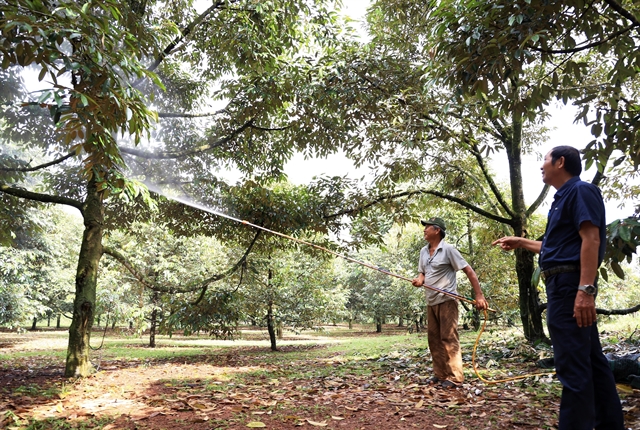
|
| Caption: A durian orchard is planted using organic methods in Đồng Nai Province’s Xuân Lộc District. — VNA/VNS Photo Hồng Đạt |
ĐỒNG NAI — Đồng Nai Province is fostering organic and high-tech agriculture to mostly meet export requirements.
The southeastern province is prioritising 10 organic agriculture projects over the next several years to produce rice, vegetables, pepper, cashew, grapefruit, durian, mango, pork, and poultry, and develop linkages between stakeholders producing, processing and selling them.
Under its plan for until 2030 it targets having 1,323ha of organic farming areas, or 0.5 per cent of its total area under agriculture.
It includes raising cattle, pigs, poultry, and goats based on organic methods besides black-tiger shrimp, fish, mud crab, oysters, and other brackish water aquatic species in mangrove forests.
It aims to increase the value of organic agriculture by 1.5-2 times over traditional agriculture, ensure the health and safety of farmers and protect biodiversity and the environment.
Under the plan, authorities have identified eight concentrated organic farming areas in Tân Phú, Định Quán, Vĩnh Cửu, Xuân Lộc, Nhơn Trạch, and Cẩm Mỹ districts.
The province will implement various measures to meet the plan’s targets, including developing human resources and rolling out support policies.
Nguyễn Văn Thắng, deputy director of the province’s Department of Agriculture and Rural Development, said the province has nine certified organic farming models covering 28.7ha and 98 high-tech farming areas covering 18,970ha.
It also has 59,754ha of farming areas with semi-auto irrigation, uses machinery and applies good agriculture practices (GAP) standards, he said.
Some 27.5 per cent of its livestock farms are air-conditioned and closed and use automatic feeding systems.
The province encourages farmers to develop organic and high-tech agriculture.
Its farmers’ associations at all levels have undertaken advocacy activities to encourage members to undertake organic and high-tech agriculture.
Last year they involved 238,000 farmers but also agricultural officials.
Development
Cẩm Mỹ is one of the province’s districts that actively encourages farmers to develop safe farming models, including organic.
It has efficient support policies for organic agriculture, and this has attracted many farmers and companies.
Chính Đức Durian Co-operative Group in the district’s Sông Ray Commune has 23 members who grow a total of 40ha of durian using organic methods.
The group uses high-tech farming methods, including the use of a drone to spray organic fertilisers and plant-protection drugs.
Trần Văn Đức, its head, said the application of advanced techniques for safe farming has helped farmers save expenses on fertilisers, drugs and labour and ensure prompt pest treatment.
According to its People’s Committee, the district has 178ha of durian that uses one automatic facility for irrigation, fertilisation, and spraying plant protection drugs.
It has 300ha of land with VietGAP certification and another 400ha are seeking to adopt GAP standards, mostly for growing durian, avocado and grapefruit.
It also has 300ha of pepper planted to safe standards that meet the requirements for exporting to the EU.
It is a leading district in developing large-scale pepper fields that spread over thousands of hectares each.
Nguyễn Ngọc Luân, director of the Lâm San Pepper Co-operative in the district, said members grow clean pepper on pooled large-scale fields, and their produce is exported to the EU.
“The potential for clean pepper exports is enormous and the co-operative hopes for support policies, especially soft loans, to expand farming areas and increase exports.”
The province has encouraged the development of linkages between various stakeholders in agriculture to improve production efficiency, sales and product value.
In Định Quán District, local authorities have called for developing such linkages for rice, corn, durian, cacao, grapefruit, and banana on a total of 2,200ha.
It has established linkages between eight companies and four co-operatives.
Trần Bá Đạt, secretary of the Định Quán District Party Committee, said: “Định Quán has potential for developing high-tech and organic agriculture.”
The district would cooperate with relevant departments and agencies to instruct farmers in applying advanced farming techniques and developing modern agriculture, he said.
It would focus on developing circular agriculture, boosting digital transformation in agricultural production and applying advanced farming techniques, he added.
The province has exported its products to a number of markets, including the EU and China.
It exported more than 120,000 tonnes of banana worth VNĐ1.4 trillion ($56 million) and 47,000 tonnes of durian worth VNĐ3.3 trillion ($130 million) to China last year.
It has 220 products rated three-star and above in the country’s “One Commune – One Product” programme.
Its agriculture, forestry and fishery production value was nearly VNĐ49 trillion ($1.95 billion) last year, an increase of 3.6 per cent from 2023. — VNS
- Reduce Hair Loss with PURA D’OR Gold Label Shampoo
- Castor Oil Has Made a “Huge” Difference With Hair and Brow Growth
- Excessive hair loss in men: Signs of illness that cannot be subjective
- Dịch Vụ SEO Website ở Los Angeles, CA: đưa trang web doanh nghiệp bạn lên top Google
- Nails Salon Sierra Madre
 VnExpress News The News Gateway of Vietnam
VnExpress News The News Gateway of Vietnam





